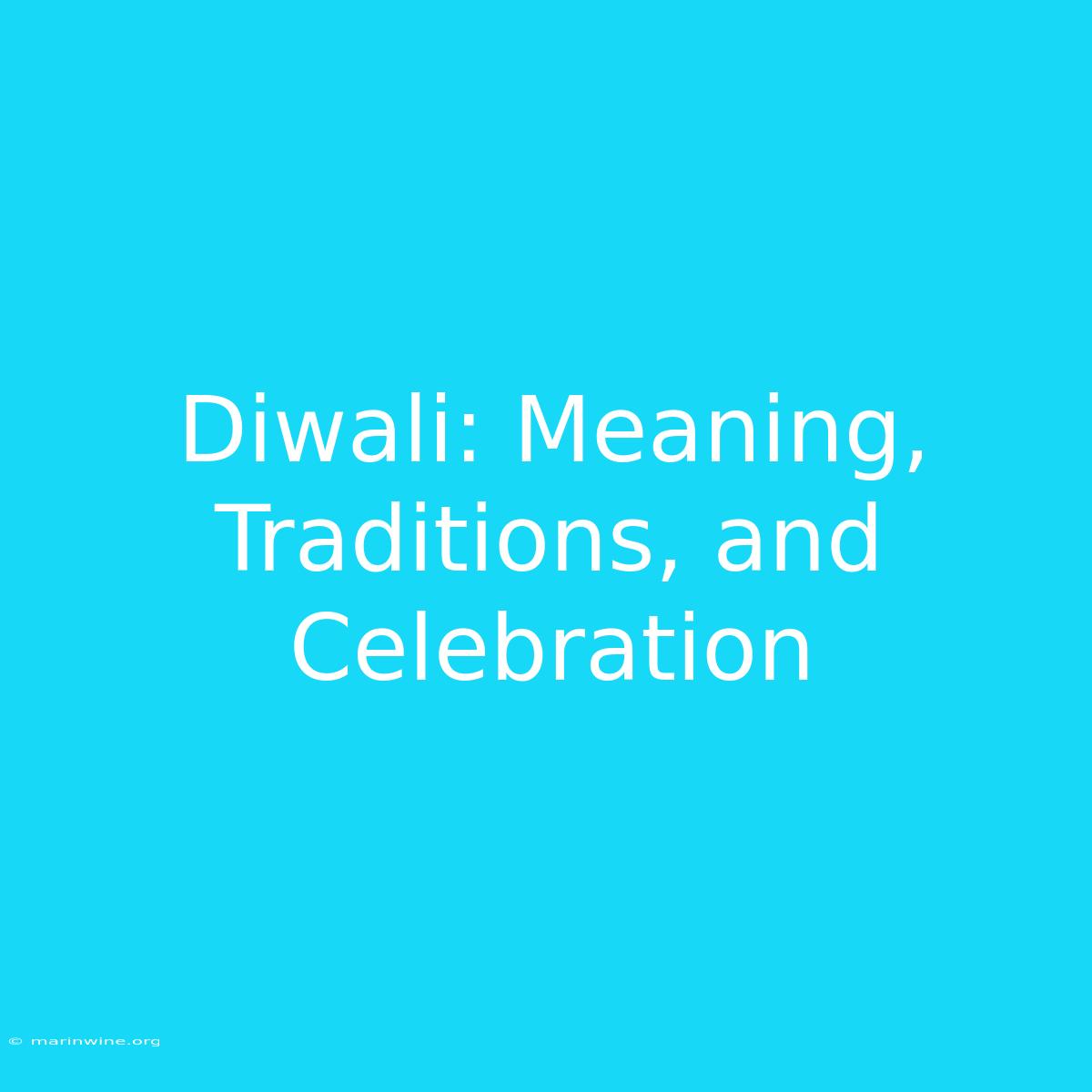Diwali: Meaning, Traditions, and Celebration
Have you ever wondered about the significance of Diwali, the "Festival of Lights"? It's more than just sparkling decorations and delicious sweets. Diwali, a major festival celebrated across India, Nepal, and other parts of the world, holds deep cultural and religious meaning. Let's delve into the fascinating world of Diwali, exploring its origins, traditions, and celebrations.
Why It Matters: Understanding Diwali goes beyond appreciating its vibrant festivities. It allows us to connect with the rich cultural heritage of millions worldwide. Learning about its traditions helps us appreciate the beauty and diversity of human expression through art, music, food, and community celebration.
Key Takeaways of Diwali:
| Feature | Description |
|---|---|
| Meaning | Victory of good over evil, light over darkness, knowledge over ignorance |
| Significance | Celebrates the return of Lord Rama to Ayodhya after defeating Ravana |
| Duration | Celebrated for five days, each with its own special significance |
| Traditions | Lighting diyas (oil lamps), decorating homes, exchanging gifts, fireworks, special prayers |
| Significance for Hindus | Diwali is a festival of new beginnings, prosperity, and happiness |
Diwali: The Festival of Lights
Diwali, a five-day celebration, signifies the triumph of good over evil, light over darkness, and knowledge over ignorance. It marks the return of Lord Rama, the seventh avatar of Lord Vishnu, to his kingdom Ayodhya after defeating the evil demon king Ravana. This victory symbolizes the triumph of righteousness and the restoration of dharma (cosmic order).
Key Aspects of Diwali:
- Religious Significance: Diwali is celebrated by Hindus, Jains, and Sikhs, each with their own interpretations of its significance.
- Symbolism of Light: The lighting of diyas (oil lamps) signifies the dispelling of darkness and the welcoming of light, knowledge, and prosperity.
- Decorations and Festivities: Diwali is known for its vibrant decorations, including rangoli (colorful patterns made on the floor), lights, and fireworks.
- Family and Community: Diwali is a time for families and communities to come together, celebrate, and share joy.
The Five Days of Diwali:
- Dhanteras: This day is dedicated to Lakshmi, the goddess of wealth and prosperity. People buy new items, especially utensils and gold, to attract good fortune.
- Choti Diwali (Small Diwali): This day is marked by the worship of Yama, the god of death.
- Diwali: This is the main day of Diwali, celebrated with lighting diyas, firecrackers, and puja (prayers).
- Annakut: The fourth day is dedicated to the worship of Lord Krishna, and people offer him an abundance of food.
- Bhai Dooj: This day is for celebrating the bond between brothers and sisters. Sisters apply tilak (a red mark) on their brothers' foreheads and pray for their well-being.
The Connection between Diwali and Prosperity:
The association of Diwali with prosperity stems from the return of Lord Rama, who brought back a period of peace and prosperity to Ayodhya. The lighting of diyas is believed to invite Lakshmi into homes, bringing wealth and good fortune. The act of gifting sweets and presents during Diwali symbolizes sharing joy and fostering strong bonds within families and communities.
The Modern Celebration of Diwali:
While Diwali retains its traditional significance, it has adapted to modern times. Today, the festival is celebrated globally, with people of different backgrounds coming together to enjoy its vibrant celebrations. Social media plays a significant role in connecting people across borders, sharing Diwali greetings, and participating in virtual celebrations.
FAQ for Diwali:
Q: What are some common Diwali traditions?
A: Lighting diyas, creating rangoli, sharing sweets and gifts, bursting firecrackers, and attending puja ceremonies.
Q: What is the significance of firecrackers during Diwali?
**A: **Firecrackers are traditionally believed to ward off evil spirits and symbolize the triumph of good over evil. However, with growing concerns about air pollution and noise pollution, many people are opting for eco-friendly alternatives.
Q: What are some of the popular Diwali dishes?
A: Sweets like ladoos, barfi, and gulab jamun are staples. Savory dishes like samosas, kachoris, and pakoras are also enjoyed.
Q: Is Diwali a religious or cultural festival?
A: Diwali is a religious festival for Hindus, Jains, and Sikhs, but its cultural significance transcends religious boundaries. It's a time for celebration, unity, and joy that resonates with people across the world.
Q: How can I celebrate Diwali in an environmentally friendly way?
A: Opt for eco-friendly diyas made of natural materials, use less firecrackers or opt for eco-friendly alternatives, and contribute to cleaning up after the celebrations.
Tips for Celebrating Diwali:
- Light Up Your Home: Decorate your home with diyas, candles, and fairy lights.
- Create Rangoli: Try your hand at creating colorful rangoli patterns, using flowers, colored powders, or sand.
- Share Sweets: Exchange sweets and gifts with loved ones to spread joy and celebrate the occasion.
- Attend Puja Ceremonies: Join your community in celebrating puja ceremonies and seeking blessings.
- Contribute to Charitable Causes: Make a difference by donating to a local charity or participating in community service activities.
Summary by Diwali:
Diwali, the Festival of Lights, is a vibrant and meaningful celebration that transcends religious boundaries. It celebrates the triumph of good over evil, light over darkness, and knowledge over ignorance, embodying a message of hope, prosperity, and unity.
Closing Message: As you celebrate Diwali, remember to embrace its deeper meanings and to spread the message of light, knowledge, and joy in your own way. Happy Diwali!

